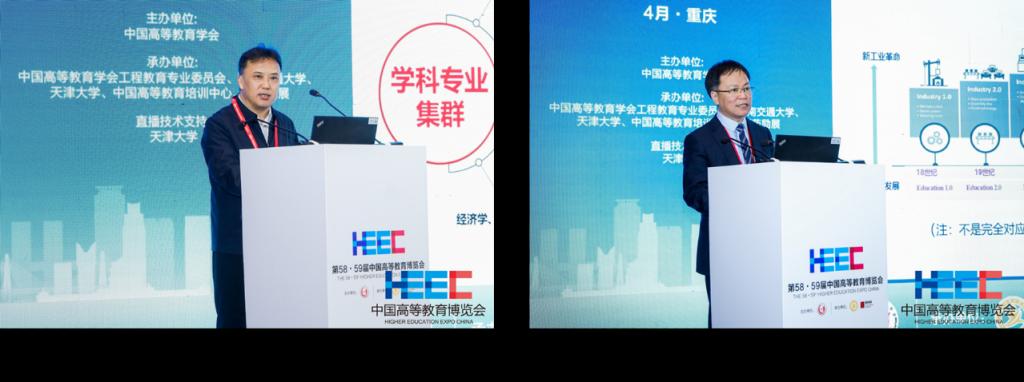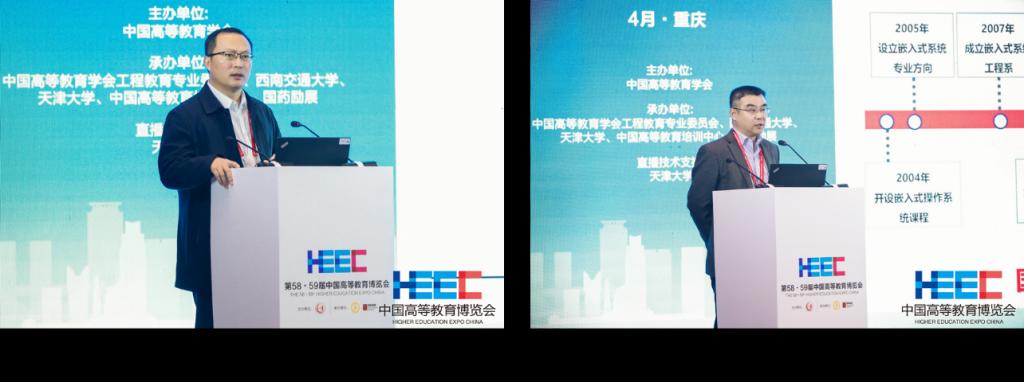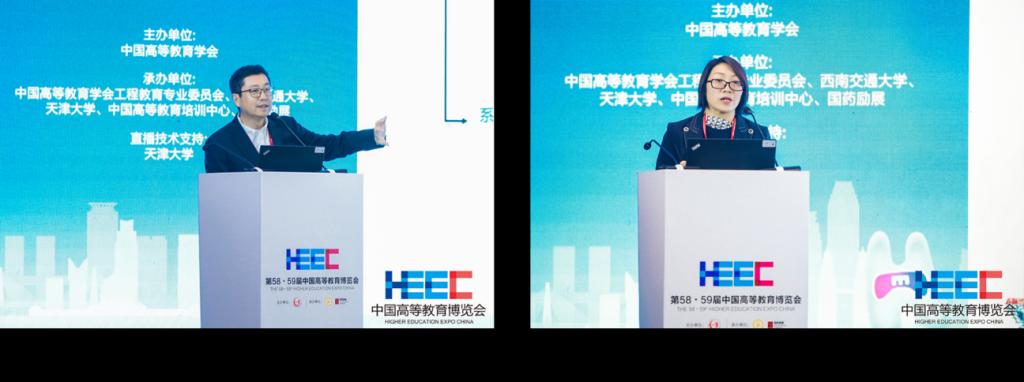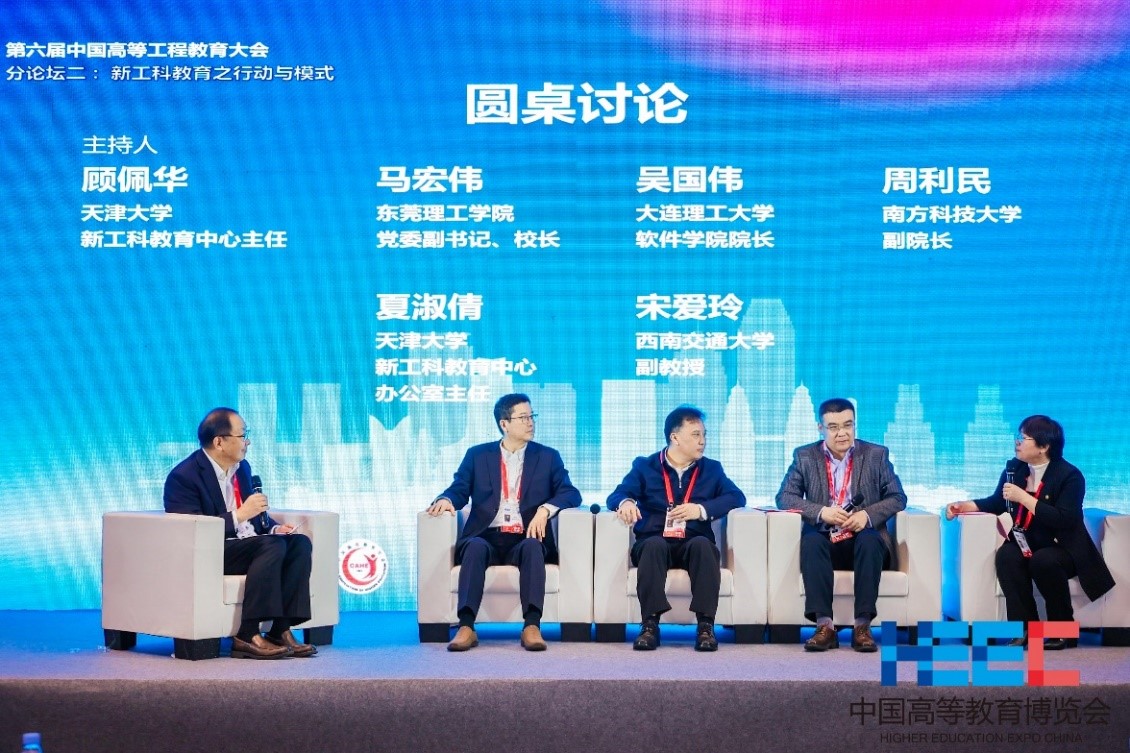Recently, the 6th Higher Education Expo China (HEEC) hosted by China Association of Higher Education (CAHE) opened in Chongqing, with the theme of “High Quality Development of Higher Education of Engineering: Practicing Innovation and Pursuing New Excellence, Interconnecting and Forging a New Journey”. The sub-forum on “Actions and Models of Emerging Engineering Education”, sponsored by Tianjin University, was a complete success.

As an important hand of colleges and universities to promote the comprehensive reform of talent training, the construction of Emerging Engineering Education has formed a new pattern of “blooming flowers” in the engineering education reform. In this forum, representatives contributed to the comprehensive reform of related fields, the construction of the School of Future Technology, School of modern Industry, and characteristic College of Software, and the project-based curriculum practice was invited to share their experience in the construction of the Emerging Engineering. More than 300 experts, business representatives, and teachers from colleges and universities across the country participated in the forum. The conference was simulcast with a cumulative audience of more than 65,000. The report session of the forum was moderated by Xia Shuqian, Director of the Office of the Emerging Engineering Education Center of Tianjin University, and the panel discussion was presided over by Gu Peihua, Academician of the Canadian Academy of Engineering and Director of the Emerging Engineering Education Center of Tianjin University.

Ma Hongwei, deputy secretary of the party committee and the headmaster of Dongguan University of Technology, shared the development process, policy guarantees, implementation effectiveness, and talent training characteristics in cultivating outstanding engineers over the past decade. He said that the college will further emancipate the mind, deepen reform, expand openness and pool resources. In addition, the school will deepen the education system, with the integration of production and education as its core, comprehensively improve the ability to talent training, cultivate outstanding engineers of the new era, enhance the effectiveness of serving economic and social development, and make greater contributions to accelerating the construction of new and high-level universities of science and technology.

Ma Xinbin, member of the Standing Committee of the CPC Tianjin University Committee and Vice President of the university, made a thematic presentation on Chinese paradigm of higher engineering education and the Emerging Engineering Education construction plan of Tianjin University. At the forum, the main practices of the construction were introduced through project-based curriculum cases and graduation design cases. He emphasized that to deepen the construction of Emerging Engineering Education in the new era and promote the iterative innovation of the paradigm of self-cultivation of talents, one should focus on the optimization and adjustment of disciplines and majors, and pay attention to the collaborative training of talents from production, study, and research to application. He also mentioned the necessity to center on the establishment of core elements of Emerging Engineering Education, and continue to innovate the development paradigm of engineering education.
Yin Guodong, director of the Office of Academic Affairs in the School of Future Technology, shared the initiation to establish the college and construction effect, and afterwards put forward in-depth consideration on the development of Emerging Engineering Education. He emphasized that the construction should face the future and the frontier of science and technology, build an interdisciplinary educational approach that integrates production and education, and aims to cultivate future leading talents in technological innovation with the potential to become strategic scientists.
Wu Guowei, dean of the School of Software Technology of Dalian University of Technology, took the construction of the characteristic and exemplary school as an example, shared the ideas and practice of the school’s specialized cultivation of software talents for Emerging Engineering Education in terms of model exploration, resources diversification, and training systems. He pointed out that the first is the deep integration of schools and enterprises, and the guidance of industry needs; the second is to drive innovation through open-source and create a systematic open-source innovation model with a complete chain of courses, practices, topics, and communities; and the third is to take in lead in the frontier field and cultivate students’ international collaboration to broaden their global perspective and enhance their communication skills.
Zhou Limin, deputy dean and chair professor of Southern University of Science and Technology, focused on the Emerging Engineering Education practice of the university, and discussed the education concept, talent training objectives and methods, and presented the curriculum construction of thorough integration of multiple disciplines and project-led teaching practice. He pointed out that the cultivation of innovative engineering students should center on multidisciplinary integration, comprehensive integration of production and education, and professional development, so as to achieve the combination of theory and practice as well as the improvement of students’ knowledge and ability.
Song Ailing, associate professor of the Southwest Jiaotong University, took the interdisciplinary course “Sports, Technology and Intelligence Life” as an example to conduct an introduction of the design ideas, implementation and learning effects of the course. She stated that the project-based courses of the Emerging Engineering Education ought to focus on the improvement of students’ interdisciplinary literacy and digital literacy, characterized by a natural and critical learning environment and the cultivation of innovative talents with a sense of social responsibility. It is also necessary to stimulate students’ innovative consciousness through integration of multiple disciplines and build a diversified curriculum evaluation system, so that the students’ thought, ability, and innovative literacy could get an overall improvement.

At present, a new round of technological revolution and industrial transformation is accelerating, and new technologies, new products, new formats as well as new models are booming, which poses new challenges to the cultivation of engineering talents. Actively deploying the education and cultivation of outstanding engineers in the new era and deepening the construction of the Emerging Engineering Education are inevitable requirements to cope with the new round of transformation. In the Panel session, all the participants conducted in-depth discussions on the new mission, tasks, and actions of the Emerging Engineering Education Construction in the new era.
It is reported that Tianjin University had successively hosted sub-forums of the HEEC as convener for four consecutive years, conducted profound discussions on key issues in cultivating talents in Emerging Engineering Education.
By: Chu Jingyi
Editor: Qin Mian






